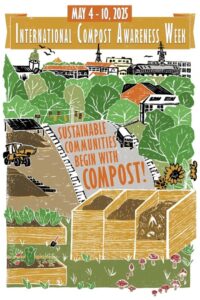
International Compost Awareness Week (ICAW) is the largest and most comprehensive education initiative of the organics recycling industry.
It is celebrated in many countries throughout the world annually during the first full week of May. Started in Canada over twenty-five years ago, ICAW has continued to grow as more people, businesses, municipalities, schools and organizations are recognizing the importance of organics recycling and compost use.
This year, the annual week-long event will be held on May 4 th – 10th. The theme, “Sustainable Communities Begin with Compost!”, drives home a powerful truth that every banana peel, coffee ground and lawn clipping we compost instead of throwing them away delivers great environmental gains by:
- Reducing Methane Emissions: Organic waste in landfills generates methane, a greenhouse gas with 86 times the global warming potential of CO₂ over 20 years. Diverting organic waste to composting or anaerobic digestion can drastically cut these emissions.
- Keeping nutrients in circulation: There are many valuable nutrients in organic residuals which can be returned to our soils for further productive use through compost. These nutrients are not returned to soil if incinerated.
- Increasing Soil Health: Compost produced from the recycling of organics residuals improves soil structure, enriches soil with nutrients, enhances water retention, minimizes soil erosion and strengthens biodiversity.
- Fighting Climate Change: Compost’s return to the soil serves as a “carbon bank”, helping to store carbon thereby removing it from the atmosphere and mitigating climate change.
Globally, composting is the heart of the circular economy. This positive action addresses the largest share of waste generated by Society as a whole, helping to:
- Recycle over 85 million tonnes of biowaste every year.
- Reduce greenhouse gas emissions by more than 9 million tonnes of carbon dioxide equivalents a year through storing carbon in soil and offsetting fertilizer use (an equivalent to
driving an average petrol/gas-powered car for 36 billion kilometers (23 billion miles); almost 95 thousand times the distance between the earth and the moon!). - Naturally recycling over 1 million tonnes of plant macro nutrients, supporting improved productivity and farm profitability.
And yet, while all this good is well known, landfilling and incineration continue as the main ways to manage unavoidable organic residuals, wasting enormous potential to address global and local sustainability goals and stop climate change.
"Compost is more than waste management—it's community transformation," remarked Dr. Stefanie Siebert at European Compost Network e.V.. "When we compost, we invest in more than soil—we invest in cleaner air, stronger communities, and a healthier planet for future generations. This impactful practice only takes us a few minutes each day. Through International Compost Awareness Week, compost advocates around the world are united in highlighting the immense potential of composting and compost for building sustainable communities."
ECN Member Activitys in ICAW 2025
Vlaco
Vlaco released a new animated film on importance of purity of vfg-waste/compost for garden/plant life.
Information videos as part of CORE project
Vlaco is a partner of the CORE project (Composting in Rural Environments), a project focusing on sustainable strategies to deal with household bio-waste in European, sparsely populated areas. As part of this project, Vlaco developed a number of information videos for the wider population:
Home Composting
Home Recycling
Selective collection and professional processing of VGF waste
